Recent Articles
Popular Makes
Body Types
2024 Genesis GV80 Road Test and Review
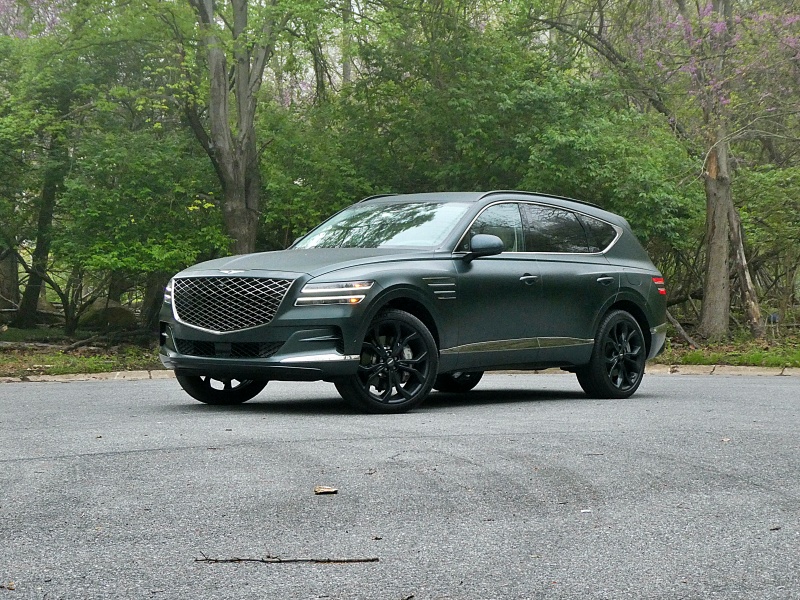
2024 Genesis GV80 Prestige Signature ・ Photo by Brady Holt
There are two tiers of luxury SUV. First are the mainstream-brand models dressed up with richer upholstery, flashier bodywork, and more high-end amenities. Then there’s the real deal – the ones engineered from the ground up as top-of-the-line machines.
You might assume that the 2024 Genesis GV80, the luxury division of Korea’s value-focused Hyundai, would have picked the former approach. Instead, like most of the Genesis lineup, the mid-size GV80 is the latter. It chases the BMW X5 and Mercedes-Benz GLE more than a Lexus RX or Cadillac XT5. And its price tag reflects that: The GV80 starts at $57,700, which is $9,000 more than the Lexus and nearly $14,000 more than the Cadillac – though about $5,000 less than the Benz and $7,000 below the BMW. To see how well Genesis justifies its high-end price tag, we just spent a week testing a top-of-the-line GV80 Prestige Signature costing $82,695. Keep reading as we cover the GV80’s pros and cons so you can see if it’s the right mid-size luxury SUV for you.
Standout Style
It’s easy for a luxury SUV to look too garish, yet also easy for it to look dull. It’s hard to make any vehicle look distinctive without looking like it’s trying too hard. To our eyes, the Genesis GV80 threads this needle splendidly.
The GV80 is upright and purposeful, with clean, straight lines yet unique details such as the split-level headlights and taillights. And the pinched windowline contrasts nicely with the dead-on-horizontal lines across the rear end: the windshield, a body crease, and then the taillights. Neither ostentatious nor derivative, the GV80 strikes a commanding presence on the road – making a compelling first impression. The 2025 model year will bring a subtle restyling and a new “SUV coupe” variant with a sleeker, less boxy profile.

2024 Genesis GV80 Prestige Signature ・ Photo by Brady Holt
Interior Excellence
The GV80 is also a full-fledged luxury SUV inside. Here, too, Genesis found a distinctive yet appealing design, which it decks out with excellent materials. It’s more overtly opulent than the more tech-focused Audi Q7 or BMW X5, and you won’t find cheap points that detract from the exceptional overall ambiance.
The GV80’s minimalist dashboard is a slim bar with a decorative strip (housing the climate vents). The two-spoke steering wheel complements this design cleverly. At the top of the dashboard sits a low, wide infotainment touchscreen measuring 14.5 inches across in total. Below it, the center console curves up gently to meet the rest of the dash, featuring climate controls and a small secondary touchscreen. Some infotainment functions take a couple of extra steps, but overall, the GV80’s controls are simpler than many rival luxury SUVs. If you appreciate the GV80 for daring to be different, act fast. The 2025 update introduces a more conventional dashboard shape and a three-spoke steering wheel, and it joins the GV80’s gauge cluster and touchscreen into a single 27-inch digital display. Still, we expect its quality and usability to remain above average.
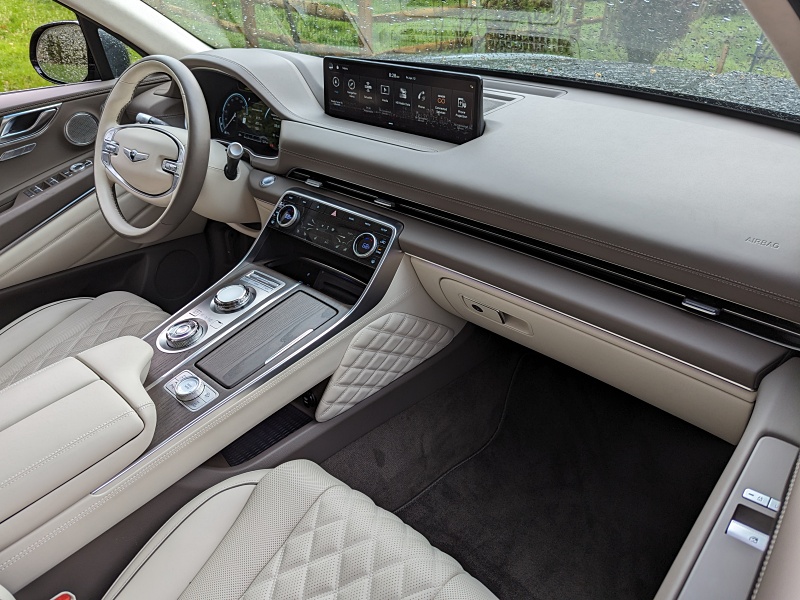
2024 Genesis GV80 Prestige Signature ・ Photo by Brady Holt
Two Comfortable Rows
The GV80 knows how to coddle passengers as well – especially the closer they get to the driver’s seat. Up front, you can get the seats with heating, ventilation, and even a massage function, along with plenty of space to stretch out. The massager isn’t as good as you’ll find in a Mercedes-Benz – it almost felt like it was pushing us off the seat at times – but of course, some rivals don’t have a massage function at all.
In the back, the GV80 is pretty comfortable, too. There’s more rear legroom than a BMW X5, the seat is well-shaped and supportive, and built-in sunshades are standard on all models. We’d just wish for a bit more foot space under the front seats. We wish Genesis didn’t reserve certain amenities for top Prestige models, though – heated rear seats and rear climate controls are common even on much less expensive SUVs. V6-powered Prestige models also add rear ventilation and power adjustability, and the top Prestige Signature like our test vehicle drops the three-person bench for two separate captain’s chairs (a total seating capacity of four passengers). The GV80 does offer a tiny third-row seat, but only on the mid-level V6 Advanced model – a curious restriction. Cargo capacity is good for a mid-size luxury SUV: 84 cubic feet behind the front seats and 35 cubic feet behind the second row. There’s just 12 cubic feet behind the optional third row, though.
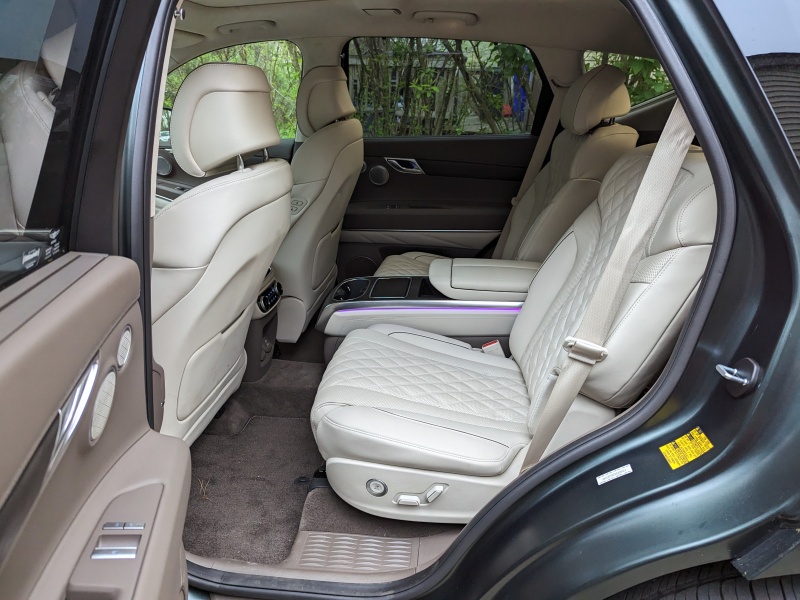
2024 Genesis GV80 Prestige Signature ・ Photo by Brady Holt
Solid and Steady
As we mentioned, the GV80 rides on a Genesis-exclusive platform rather than sharing its underpinnings with a less-expensive Hyundai model. Like most of its rivals, this is a rear-wheel-drive-based platform, though all GV80s come with all-wheel drive.
The GV80 is a heavy SUV, topping 5,000 pounds with all the options. That’s about the same as an Audi Q7, BMW X5, or Mercedes-Benz GLE, but it’s hundreds of pounds more than the likes of the Lexus RX, Lincoln Nautilus, and Cadillac XT5. This extra mass helps the GV80 feel solid and steady as it goes down the road. It doesn’t quite match a Q7 or X5 for sporty handling, but it’s not clumsy. And while its ride jiggles around a bit on the highway, that’s nothing unusual for a modern luxury SUV with enormous wheels like the 22-inchers on our test car. Quiet, comfortable, and confident, the GV80 feels like a high-end machine on the road.
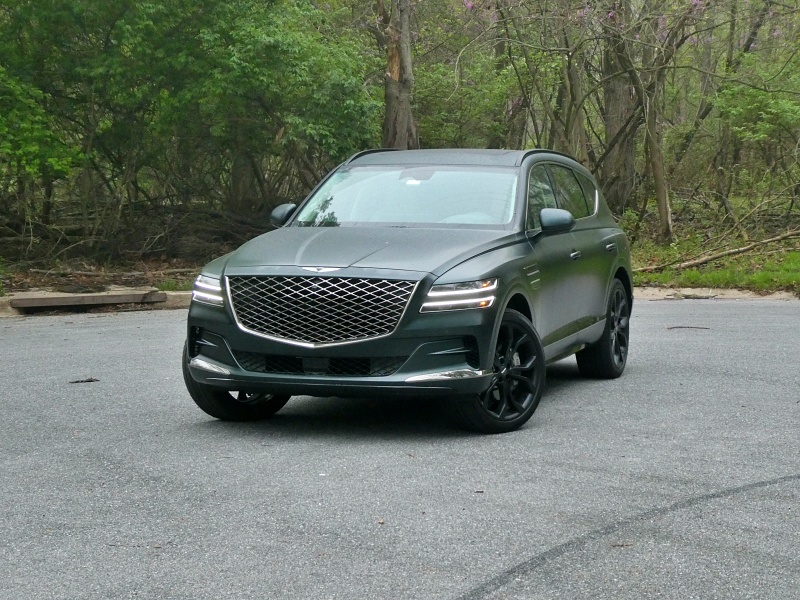
2024 Genesis GV80 Prestige Signature ・ Photo by Brady Holt
Two Powerful Engines
Helping offset the GV80’s hefty weight, Genesis provides this SUV with a choice of two powerful turbocharged engines. A 2.5-liter four-cylinder making 300 horsepower and 311 lb-ft of torque comes standard, or you can pay about $6,000 extra (including a few extra features) for a 3.5-liter V6 with 375 hp and 391 lb-ft of torque. Both engines – which Genesis calls the 2.5T and 3.5T, respectively – are paired to an eight-speed automatic transmission.
You can get either engine on each GV80 trim level except the Prestige Signature like our test vehicle, which is V6-only. The engine is smooth, rich, and potent. It feels most natural at effortlessly building speed rather than racing forward like a BMW X5, and the BMW is also quicker despite similar specifications. If the 3.5T feels too steep to add, the 2.5T is plenty quick as well. It doesn’t sound as nice as the V6, but you won’t hear too much of it inside the GV80’s hushed cabin. When we tested the 2.5T a few years ago, our biggest complaint was that the transmission would occasionally let the engine fumble in too-low rpms. We’d recommend driving both to see if the 3.5T is worth the steep premium.
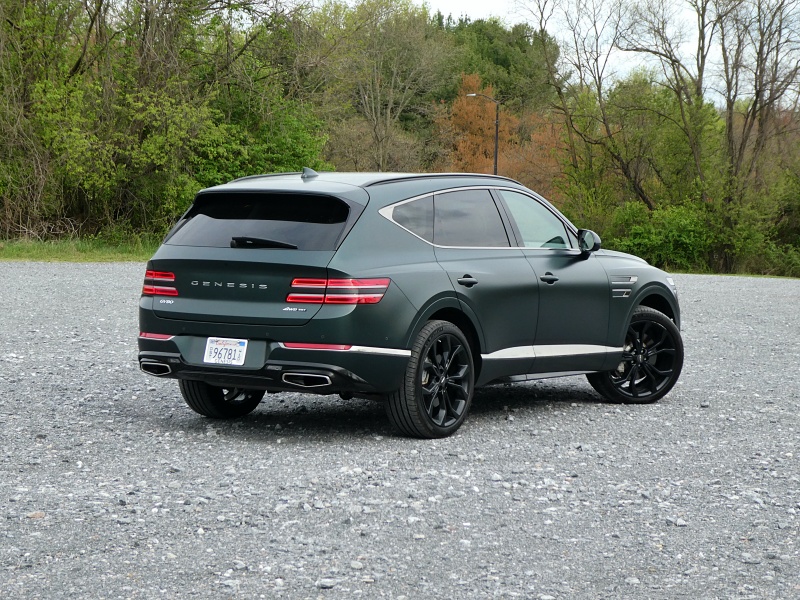
2024 Genesis GV80 Prestige Signature ・ Photo by Brady Holt
Middling Mileage
The 3.5T doesn’t only cost more to buy, but it also drinks more premium-grade fuel than the 2.5T. The 2024 Genesis GV80 2.5T gets an EPA-estimated 20 mpg in the city, 24 mpg on the highway, and 22 mpg combined, and our test vehicle averaged 23 mpg a few years ago. However, the 3.5T drops to 18 mpg in the city, 23 mpg on the highway, and 20 mpg combined, and our latest test vehicle (not driven in identical conditions to the 2.5T) averaged just 18 mpg during our weeklong test.
That’s not terrible mileage for a heavy, powerful luxury SUV, but the leading competition has advanced further. Mercedes and BMW now use mild-hybrid electric boost to juice their six-cylinder efficiency – to great effect. The GLE 450 averages 22 mpg in mixed driving despite matching the GV80 3.5T’s size and performance, and the X5 gets an incredible 25 mpg despite being even quicker. Plus, the GLE and X5 are also available as plug-in hybrids, and these PHEVs each provide about 40 to 50 miles of fully electric range before needing their gas engines at all.
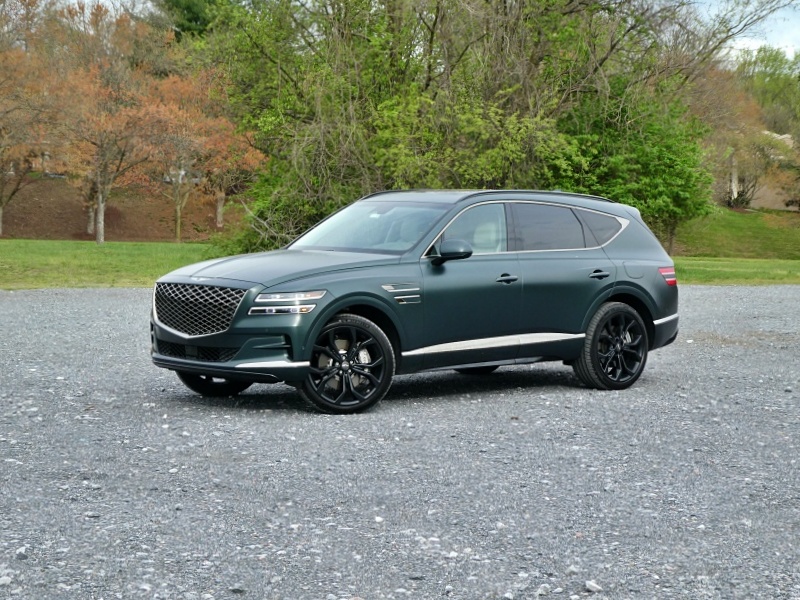
2024 Genesis GV80 Prestige Signature ・ Photo by Brady Holt
Packed With Features
The GV80 starts at $57,700 for the 2.5T standard and runs all the way up to $81,750 for the top 3.5T Prestige Signature, plus a $1,195 destination charge.
Our top picks in the lineup are the 2.5T Advanced ($63,950) and the 3.5T Standard ($64,600), depending on the engine you pick. All GV80s include high-end amenities that include a heated steering wheel, wireless smartphone charger, and power liftgate, and the base model includes synthetic leather upholstery along with a 12-speaker stereo. Both the 2.5T Advanced and 3.5T Standard also add ventilated front seats, a panoramic moonroof, and 20-inch wheels (versus the standard 19s). Skipping the extra cylinders on the 2.5T Advanced also buys you genuine leather, a 21-speaker stereo, a blind-spot camera, and a surround-view parking camera. The only three-row model, the 3.5T Advanced, costs a steeper $71,950 and also includes the heated second-row seats and tri-zone climate control we mentioned earlier. Overall, depending on what options are must-haves for your GV80, the Genesis can either be a reasonable buy for a luxury SUV or a fairly dear one.
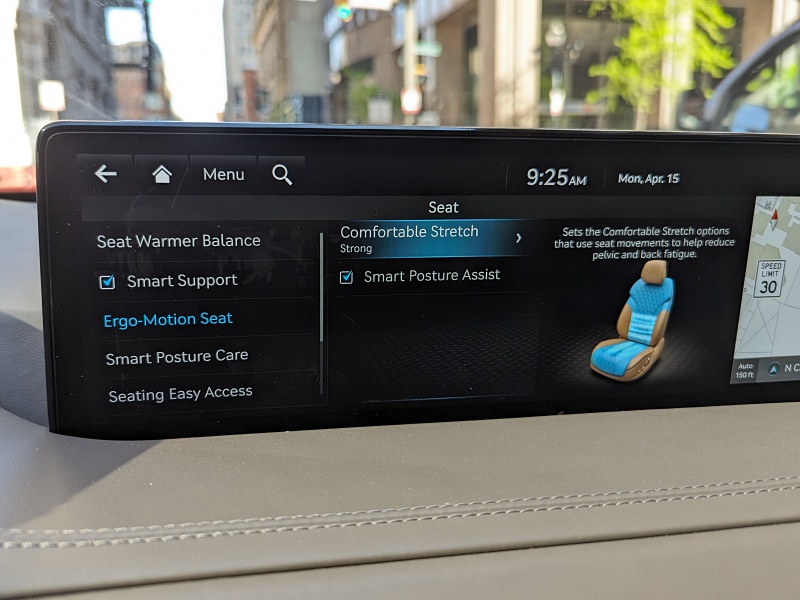
2024 Genesis GV80 Prestige Signature ・ Photo by Brady Holt
Competitors to Consider
As we mentioned, the GV80 slots in price between its German rivals and the competition from America and Japan. It has a better-built interior, more power, and more sophisticated ride and handling than the Lexus RX, Lincoln Nautilus, or Cadillac XT5, but they tend to cost much less while still delivering enough of a luxury experience for plenty of folks. They’re also more fuel-efficient.
Compared with the Germans, the GV80’s biggest downside is again its fuel consumption. Not only is there no hybrid version, but its gas-only four-cylinder and V6 engines use more fuel without offering better gas mileage in exchange. The BMW X5 and Audi Q7 are sportier and more fun to drive, and the Q7 and Mercedes-Benz GLE have a little more room and widely available third rows. Yet despite its lower price tag, the GV80 matches or beats these rivals for interior build quality.
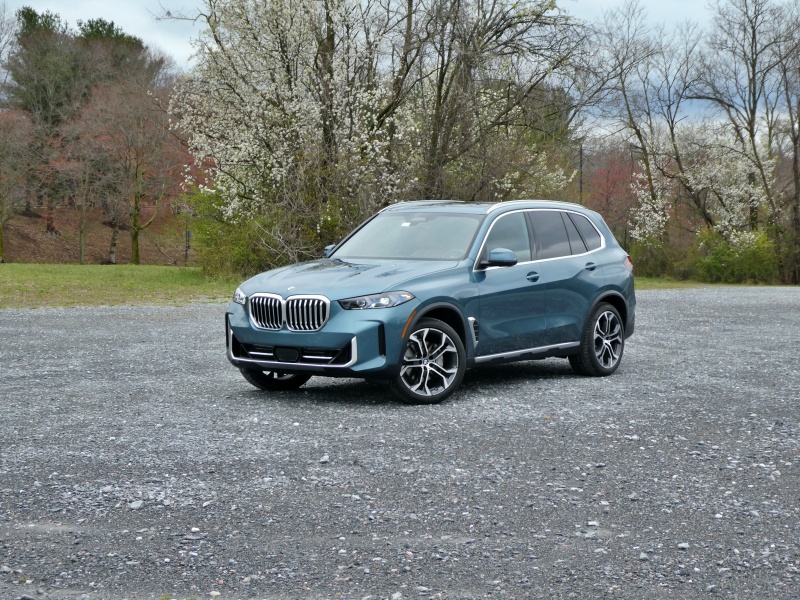
2024 BMW X5 ・ Photo by Brady Holt
Imperfect but Impressive
We can nitpick the 2024 Genesis GV80. In a perfect world, the suspension would glide more smoothly down the road, gas mileage would be better, the four-cylinder engine would never stumble, there would be more second-row foot space under the front seats, the third-row seat would be optional across the lineup, and more amenities would trickle down to the Standard and Advanced models.
But these imperfections don’t ding the GV80’s overall superlative ambiance. It’s built to impress, and it does. None of our nitpicks takes away from the big-picture advantages: the confidence of its driving manners, the excellence of its interior quality, and the elegance of its design. Even if some of its downsides mean it won’t be for everyone, it’s still a standout for the right owner.
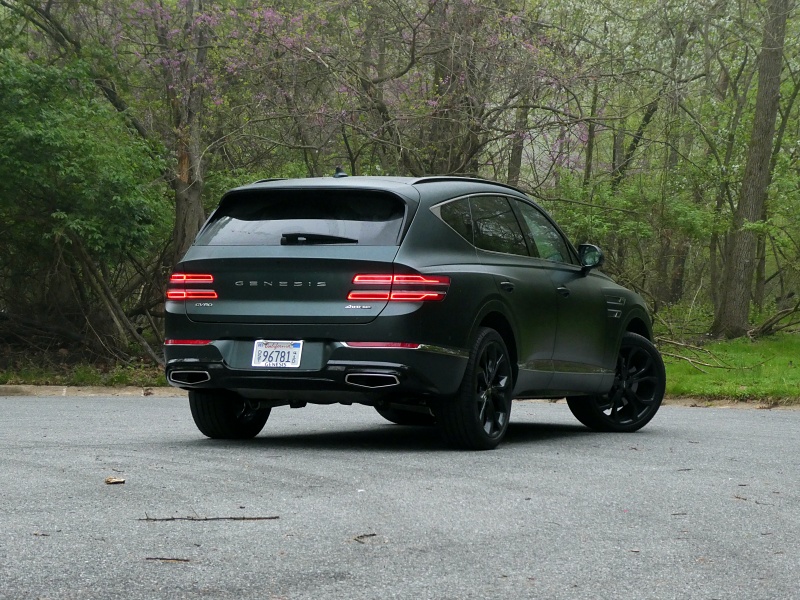
2024 Genesis GV80 Prestige Signature ・ Photo by Brady Holt